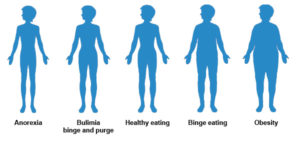Medical Complications of Anorexia Nervosa:
- Low heart rate, low body temperature, low blood pressure, irregular heartbeat
- Slowed digestion causing pain, early fullness, nausea, bloating and constipation
- Hepatitis of starvation, liver failure
- Loss of period in females, low testosterone in males, infertility
- Bone marrow suppression, anemia
- Bone loss and osteoporosis
- Thyroid abnormalities, low blood sugar
- Brain atrophy, cognitive difficulty
- Dry skin, hair loss, lanugo hair growth
- Aspiration pneumonia, respiratory failure
- High risk for refeeding syndrome, a potentially deadly complication of injudicious refeeding
Medical Complications of Bulimia Nervosa:
- Dental erosion and infections, parotid gland swelling
- Esophageal rupture
- Gastroesophageal reflux (GERD), constipation
- Low potassium, low sodium
- Severe edema or fluid overload
- Dehydration, fainting
- Irregular heartbeat
- Seizures
For Treatment:
First know the red flags. Red flags that may indicate an eating disorder include:
- Skipping meals
- Making excuses for not eating
- Eating only a few certain “safe” foods, usually those low in fat and calories
- Adopting rigid meal or eating rituals, such as cutting food into tiny pieces or spitting food out after chewing
- Cooking elaborate meals for others, but refusing to eat them themselves
- Collecting recipes
- Withdrawing from normal social activities
- Persistent worry or complaining about being fat
- A distorted body image, such as complaining about being fat despite being underweight
- Not wanting to eat in public
- Frequent checking in the mirror for perceived flaws
- Wearing baggy or layered clothing
- Repeatedly eating large amounts of sweet or high-fat foods
- Use of syrup of ipecac, laxatives, the over-the-counter weight-loss drug orlistat (Alli), or over-the-counter drugs that can cause fluid loss, such as menstrual symptom relief medications
- Use of dietary supplements or herbal products for weight loss
- Food hoarding
- Leaving during meals to use the toilet
- Eating in secret
When to see a doctor
Because of its powerful pull, an eating disorder can be difficult to manage or overcome by yourself. Eating disorders can virtually take over your life. You may think about food all the time, spend hours agonizing over what to eat and exercise to exhaustion. You may feel ashamed, sad, hopeless, drained, irritable and anxious. You may also have a host of physical problems because of your eating disorder, such as irregular heartbeats, fatigue, and bowel or menstrual troubles. If you’re experiencing any of these problems, or if you think you may have an eating disorder, seek medical help.
Urging a loved one to seek treatment
- Unfortunately, many people with eating disorders resist treatment. If you have a loved one you’re worried about, urge him or her to talk to a doctor. Even if your loved one isn’t ready to acknowledge having an issue with food, you may be able to open the door by expressing concern and a desire to listen. If you’re concerned your child may have an eating disorder, contact his or her doctor about your concerns. You can get a referral to qualified mental health providers for treatment.
- Keep in mind, however, that in children it’s sometimes hard to tell what’s an eating disorder and what’s simply a whim, a new fad, or experimentation with a vegetarian diet or other eating styles. In addition, many girls and sometimes boys go on diets to lose weight, but stop dieting after a short time. If you’re a parent or guardian, be careful not to mistake occasional dieting with an eating disorder. On the other hand, be alert for eating patterns and beliefs that may signal unhealthy behavior, as well as peer pressure that may trigger eating disorders.

